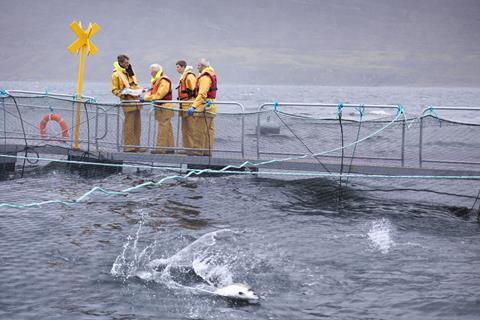
Atlantic salmon production increased dramatically in 2024, but it was not enough to stop a drop in employment, according to a Scottish government report.
The Scottish fish farm production survey 2024, released last week, showed a 27% increase in Atlantic salmon production to 192,000 tonnes.
Despite the rise, it was not enough to stave off a decline of nearly 10% in staff directly employed in salmon production – although the figure referred to the production of Atlantic salmon in seawater.
Salmon Scotland said the figures reflected the “challenges faced by many employers in attracting and retaining staff in some of the most rural areas of Scotland” and noted a tendency of “smaller farming teams” in 2024.
The total number of staff involved in Atlantic salmon production across Scotland was 1,362 in 2024, split between 1,330 employed full-time and 32 part-time, compared to 2023 when there were 1,418 full-time staff and 62 part-time.
The numbers did not include staff involved with processing or marketing activities, supply chain businesses, or employees who are “integral” to the production of Scottish salmon, such as veterinary and health professionals.
“These figures reflect another successful period for our sector, with farm-raised Scottish salmon production up by more than a quarter, demonstrating the incredible hard work of our farmers and the growing demand for our highly nutritious fish,” said the CEO of Salmon Scotland Tavish Scott.
“With sales of the UK’s most popular fish increasing at home, and exports approaching £1bn, we sustain thousands of rural jobs and enable coastal communities to thrive.”
Read more
-
Alleged animal abuse caught on camera at Scottish trout farm
-
Devolved nations criticise new Fishing & Coastal Growth Fund
-
Key fish stocks decline further, warn Good Fish Guide and MCS
“Production increased by 27% in 2024, while the number of staff decreased by 8%,” said Abigail Penny, executive director of Animal Equality UK. “Once again, giant multinational corporations are bulldozing their way across Scotland’s coasts, prioritising profit over people, animals, and our shared environment.”
Penny also raised concerns about the level of deaths in Atlantic salmon, from survival to harvest, and said the report was “certainly no cause for celebration” and labelled it “a national scandal”.
“Instead of addressing the undeniable systemic welfare and environmental failures, the salmon industry is ploughing ahead with aggressive expansion plans,” she added.
Salmon Scotland dismissed Animal Equality UK’s statement and said the data was for fish that were first put to sea in 2022 – a year marked by microscopic jellyfish, which were a key contributor to the reduced survival of farmed salmon. It said more recent data showed monthly survival of farmed salmon averaged 99.12% between January and June 2025.
“While salmon face natural challenges in the sea like any fish, our farmers also uphold the highest animal welfare standards anywhere in the world and have invested more than £1bn in new tech, leading to significantly improved survival rates in 2024 and 2025,” said Scott.
The Scottish government was approached for comment.



















No comments yet